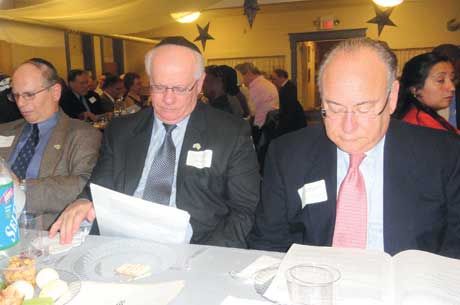Jewish Labor Committee partners with Working Families United: JLC wants to be ‘shidduch between Jewish community and the local labor movement’

Historically, the Jewish community has been a partner with organized labor, but the connection has weakened in recent years. Martin Schwartz, executive director of the Jewish Labor Committee, wants to reinvigorate it. To that end, the nonprofit JLC recently became a partner agency in Working Families United for New Jersey, a statewide grassroots coalition of labor, religious, community, civil rights, students’, women’s, and retirees’ groups.
This move is part of the JLC’s broader effort to rekindle traditional ties between Jewish groups and organized labor at a time when, according to the agency, labor unions are being unfairly blamed for the nation’s ills.
The partnership “will help us to advance both sets of interests — those of the labor movement and those of Jewish groups,” Schwartz said.
He explained that often there is overlap between the labor movement and Jewish communal organizations in terms of lobbying efforts.
“Often the labor movement and Jewish groups are advocating for the same issues and not aware of it,” he said.
He expects the partnership will strengthen both groups’ abilities to advance issues of common concern such as funding for education, health care, unemployment compensation, and job training.
“Unions are understanding they need to go beyond just union membership to work with people concerned about these issues,” said Schwartz. Similarly, Jewish groups that “receive a lot of federal money for services they provide to the elderly and the poor in the Jewish community and others” realize they need allies, especially in a cutback-happy climate, he said.
Jacob Toporek, executive director of the New Jersey State Association of Jewish Federations, believes the JLC’s move is “natural” and will build the influence of Jewish organizations in the area.
“As much clout as the Jewish community thinks it has, it can’t be as effective as it is working with others who feel the same way about certain issues,” Toporek said.
Issues Toporek said are of growing concern to his agency include Medicaid reimbursement for the elderly and a “new lower middle class” of the unemployed seeking help from federations.
“We are concerned with the impact of cuts in Medicaid on nursing homes and the elderly poor,” Toporek said. “In that respect we do share a lot of those concerns [with the JLC and WFUNJ].”
The JLC seeks to be matchmaker between the local Jewish and labor communities, according to to Arieh Lebowitz, its associate director.
“We speak the language of the Jewish community and the language of labor,” said Lebowitz. “The Jewish community used to understand the language of labor, and a lot of labor unionists spoke Yiddish. There are still Jews in the labor movement, but fewer have roots in the Jewish community.… Our goal is to be a shidduch between the Jewish community and the local labor movement.”
The JLC was formed by Yiddish-speaking immigrant trade union leaders in 1934 in reaction to the rise of Nazism in Germany, according to the JLC website. During World War II, the JLC established underground channels to anti-Nazi labor, socialist, and Jewish forces. Historically, in the United States, the JLC maintained close ties with the American Federation of Labor and the Congress of Industrial Organizations (AFL-CIO).
One possibility that could emerge from the new partnership with WFUNJ would be the presentation to local labor unions of a program developed by the Jewish Community Relations Council of UJA Federation of Northern New Jersey on Israel as a democracy, according to Joy Kurland, the agency’s director. Schwartz recently met with the JCRC and suggested this idea.
Another possibility would be to arrange for local labor unionists to meet with Israeli labor unionists, Kurland added.
The JLC’s effort to revive traditional ties between the Jewish and labor communities comes at a time when labor unions are weathering criticism across the state and the nation.
“Unions and collective bargaining are under attack,” said Schwartz. “It’s important to raise the level of awareness and advocacy on these issues.”
The JLC’s outreach is also social: The agency held its annual Labor Seder in partnership with the State Association of Jewish Federations on April 13. Held at Cong. Ahavath Sholom, the only remaining synagogue in Newark, it brought together members of the local Jewish and other communities as well as labor union activists. Guests included Thomas Giblin, president of the Essex-West Hudson Labor Council, as well as leaders of several local labor unions including the Food and Commercial Workers’ Union, the Bakers’ and Confectioners’ Union, the Service Employees’ International Union, and the International Association of Machinists.
Also in attendance were Toporek and Ruth Cole, president of the State Association of Jewish Federations.
“It was a lovely gathering of people from many walks of life celebrating freedom for the Jewish people and for all people,” said Cole, who lives in Ridgewood.
“I’ve been to three or four Labor Seders and this one was the best,” said Toporek. “The people who organized it worked well together. They tried to bring the labor unions and the communities together and succeeded. You could really feel warmth in the room.”
This entry was written by Heather Robinson and posted on April 29, 2011 at 6:27 pm and filed under Features. permalink. Follow any comments here with the RSS feed for this post. Keywords: human-rights. Post a comment or leave a trackback: Trackback URL. */?>




